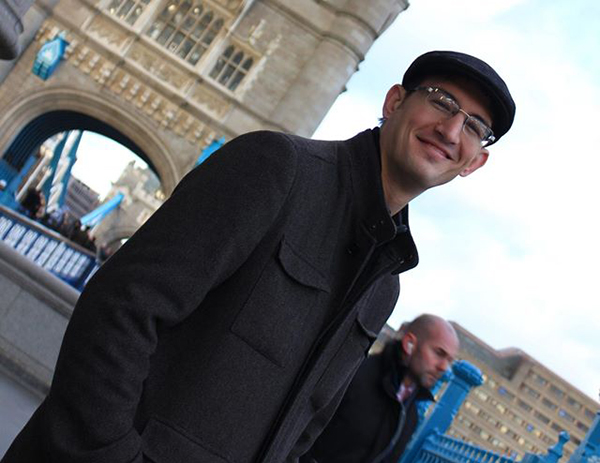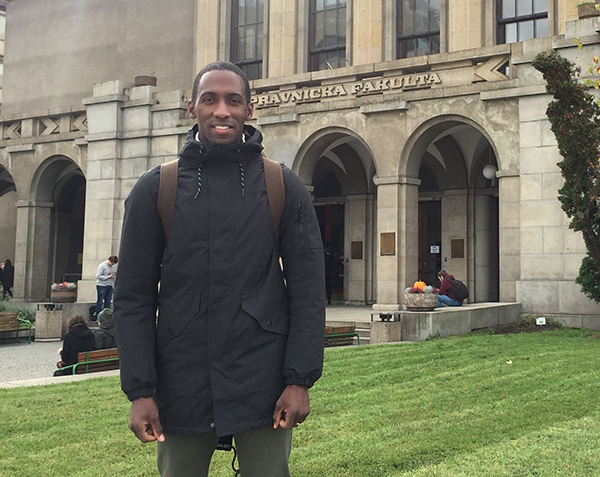Education After Law School
Graduates are inspired to seek further education abroad
From Washburn Lawyer - 2021-22
By Angela Lutz
As many Washburn University School of Law graduates can attest, a successful international career often starts in Kansas. For John Westerhaus, ’12, curiosity about the world began long before law school. As a child in Overland Park, Kansas, he played video games online with people from across the globe, giving him early exposure to other places and cultures. This burgeoning inquisitiveness influenced his decision to pursue his LL.M. at University College London in the United Kingdom after graduating from Washburn.
 “Connecting with people in other countries as a kid made me understand that other points of view can be useful in assessing your own life – even in Kansas,” Westerhaus said. “I still find this useful – there are core aspects of international law that everyone agrees on, but there are also opportunities to look at the ways someone else does something and say, ‘Maybe we should try that.’”
“Connecting with people in other countries as a kid made me understand that other points of view can be useful in assessing your own life – even in Kansas,” Westerhaus said. “I still find this useful – there are core aspects of international law that everyone agrees on, but there are also opportunities to look at the ways someone else does something and say, ‘Maybe we should try that.’”
Today Westerhaus’ legal practice is based in the Midwest – he works on employee benefits and executive compensation issues at Kutak Rock in Omaha, Nebraska. But he still relies on his international training to tackle legal challenges and more deftly respond to and incorporate a variety of stakeholders’ perspectives.
“Internationally educated folks attack legal problems from another perspective that I appreciate,” he said. “If law school teaches you how to think about the law, then I think that international attitude can be learned as much as the domestic attitude. It offers a way of thinking that allows you to accommodate different interests.”
Educational Differences
 An international education might provide a new way of looking at things because many law schools overseas approach legal education from a different angle. Marvin Tador, ’19, completed his LL.M. in international law and protection of the environment at Charles University in Prague, Czech Republic, and he now works as an adjunct lecturer at the John H. Carey II School of Law at Anglo American University in Prague. Having worked as an instructor and attended classes overseas, Tador has noticed that law students at American schools are often expected to ask and answer more questions in class.
An international education might provide a new way of looking at things because many law schools overseas approach legal education from a different angle. Marvin Tador, ’19, completed his LL.M. in international law and protection of the environment at Charles University in Prague, Czech Republic, and he now works as an adjunct lecturer at the John H. Carey II School of Law at Anglo American University in Prague. Having worked as an instructor and attended classes overseas, Tador has noticed that law students at American schools are often expected to ask and answer more questions in class.
“My international education was less taxing because university lecturers and professors did not uniformly utilize the Socratic method,” Tador said. “Some of the students did not possess a law degree, which further altered the classroom experience. In fact, this variation often enhanced the classroom discussion because the non-J.D. classmates had other impressive degrees, backgrounds, and perspectives.”
Jessica Dorsey, ’08, noticed some of the same differences in her legal education at Utrecht University in the Netherlands, where she earned her LL.M. after finishing her law degree while participating in Washburn’s study abroad program. Now she is an assistant professor of international and European law at Utrecht University, having put down roots and started a family in the Netherlands over the last 13 years. This has given her plenty of time to observe subtle differences in the way law is taught.
“Law school in the US is based on the Socratic method – you prepare your cases for the day, and if you’re on the hot seat, the professor is peppering you with questions, and it’s your day to shine or falter, as it were,” Dorsey said. “Here the Socratic method isn’t used widely. We work more in smaller groups in an intimate setting that requires more of a collaborative effort. It’s a different approach to legal education.”
Incorporating What Works
 While teaching at Utrecht University, Dorsey has also used aspects of her American education to shape her students’ classroom experience. She relies upon her extensive knowledge in international human rights – as well as her work conducting research for a variety of non-governmental organizations and think tanks – to develop educational techniques for Utrecht University’s graduate and undergraduate programs. While embarking on this endeavor, Dorsey has relied upon her Washburn education to integrate skills-based classroom techniques into her current law curriculum.
While teaching at Utrecht University, Dorsey has also used aspects of her American education to shape her students’ classroom experience. She relies upon her extensive knowledge in international human rights – as well as her work conducting research for a variety of non-governmental organizations and think tanks – to develop educational techniques for Utrecht University’s graduate and undergraduate programs. While embarking on this endeavor, Dorsey has relied upon her Washburn education to integrate skills-based classroom techniques into her current law curriculum.
“I take a lot of what we did at Washburn and set up programs that mirror those or borrow from them to serve as a launching pad for law students here into their careers,” she said. “I’m trying to make law a verb for the students – something they do and not just something that they learn. They’re working on presentation skills, writing skills, time management, culturally sensitive interpersonal relationship building – skills that transfer to their careers.”
Tador also credits Washburn with helping prepare him for his studies at Charles University, particularly by sharpening his analytical skills, legal research capabilities, and verbal and written communication skills. He relied on these abilities when working on his LL.M. thesis, as well as when he completed an opinion piece on policing in America and autonomous zones and when he interned with the Ministry of Finance of the Czech Republic to scrutinize Czech securitization laws.
“These skills have been instrumental during my nascent career in the Czech Republic,” Tador said. “Nowadays, I use these skills daily to teach my students about the law at Anglo-American University, and my experience as an Ichabod shapes my teaching methodology.”
With all of the benefits an international education can bring, Tador, Westerhaus, and Dorsey all emphasize that one of the most rewarding aspects is getting outside of their comfort zone.
“Moving to a new place – even to the other side of the state where you’re from – to be faced with something new is something I would recommend to everyone I know,” Dorsey said. “Even if it’s scary, you’ll get through it – and on the other side, you’ll be a better person for it.”